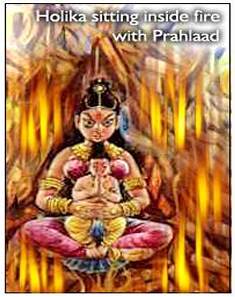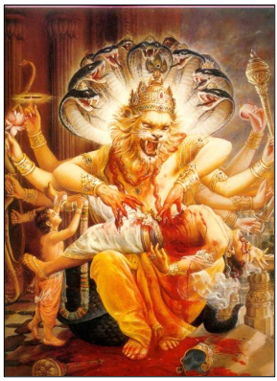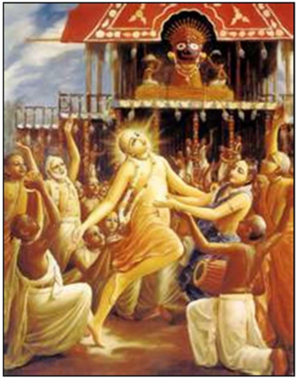Talk:Smaraṇa (Remembering the Lord)
By Vishal Agarwal
A modern scholar defines this practice of Bhakti as follows- Smaraṇa means remembering God throughout the day. You constantly think about the superlative attributes of the divine: his strength, nobility, purity, power, love, and grace. Reading the inspiring stories in Hinduism’s holy scriptures helps. So does chanting your mantra. Eventually, even your dreams are imbued with divine remembrance.
Unfortunately, most of us are ensnared by the attraction of the mundane world and think of worldly objects instead of the Bhagavan, to our detriment- The mind of a wretch is always attached to worldly objects. If one's mind were that much attached to Narayana, how could he not be released from bondage? Garuda Purāṇa 1.230.36
Hindu scriptures extoll the merit of constant remembrance of the Bhagavan in many verses, especially at the time of one’s death. Some passages are cited below-
Agni! The learned move your heart by meditation on You. May our praises glorify you. Rigveda 8.44.19
Fix your mind on Me, be devoted to Me, perform your worship to Me, make reverence to Me. Thus, having disciplined in Yog, with Me as your Supreme Goal, you shall indeed come to Me. Gita 9.34
This much is the purpose of practicing the paths of Jnana, Yog, and Karm – that man may have the remembrance of Narayana at the time of death. This, indeed, is the highest gain in life. Bhāgavata Purāṇa 2.1.6
And he who at the time of his death, having abandoned his body, dies while remembering me alone, he proceeds to a state of existence in Me – there is no doubt about this. Gita 8.5 Of whatever state of existence he thinks of at the time of leaving the body, to that state of existence indeed he goes, because of constant contemplation on that particular state of existence. Gita 8.6
Therefore, at all times, remember me and fight. With your mind and intellect absorbed in Me, you shall come to Me alone – of that there is no doubt. Gita 8.7
He who meditates (on God at the time of death) with a mind that does not swerve and is disciplined by the constant practice of meditation (to focus on God at all times) goes to the Supreme, Divine Indwelling Being. Gita 8.8
He who meditates on the All-Knowing, the Ancient, All-ruler, minuter than then minute, Supporter of all, of Inconceivable Form, effulgent as the sun and beyond darkness (i.e., transcends all darkness). Gita 8.9 He who, at the time of leaving his body, endowed with devotion and steady mind, places his life-breath perfectly in the middle of his two eyebrows with the power of yog, he reaches the Supreme, Divine (or resplendent) Being. Gita 8.10 All the gates of the body restrained, the mind confined in the region of heart, one’s life force fixed in the head, established in Yogic concentration; constantly reciting ‘Om,’ the one syllable form of Supreme Being (Brahman), he who departs remembering Me while giving up his body reaches the Supreme State (of Moksha). Gita 8.12-13
I am easily attained by that Yogi who meditates on Me constantly, whose mind is focused on Me and who does not think of anything else. Gita 8.14
Having attained Me, these great souls are no longer taking rebirth in this world, which is impermanent and the abode of pain, because they have reached the state of highest perfection. Gita 8.15
The benefits of constant remembrance of the Devta/ Devi are enumerated below- The constant remembrance of Krishna renders a man sinless. It purifies and pacifies the mind and generates in him Bhakti and Jnāna, accompanied by Vairāgya and Vijnāna. Bhāgavata Purāṇa 12.12.45
The Story of Prahlāda, one of the best Bhaktas of Bhagavan Vishnu
Prahlada, son of an Asura called Hiranyakashipu and Kayadhu, was Bhagavan Vishnu’s bhakta. His life is an example of an ideal Bhakta who did not forget the Bhagavan even once. Hiranyakashipu was a very evil king. He did not allow anyone in his kingdom to worship Bhagavan. He said – “No one should worship Vishnu because he is my enemy. If anyone wants to pray, he should worship me.”
Hiranyakashipu prayed to Bhagavan Brahma for a long time. When Bhagavan Brahma was pleased and told Hiranyakashipu to ask for something, the king said – ‘I want that I should not die during the day or the night, inside or outside my house. And no animal, or bird or human being, and no weapon should be able to kill me.” Brahma ji gave this boon to Hiranyakashipu. Now, the king became undefeatable. Therefore, he became very proud and thought that he was now more powerful than Bhagavan. This is why he asked everyone in his kingdom to stop worshipping Bhagavan Vishnu and worship only him instead. But, his son, Prince Prahlada, was different from other children of his age. He spent the whole day thinking and singing the Bhagavan’s name, in addition to being a very good student. In his school, he would collect his classmates together and teach them: “Life is short. We do not know if we will live tomorrow. And human birth is very difficult to get. We could have been animals or plants, too! Therefore, we should not waste our lives as humans. Right from the childhood, we should start worshipping Bhagavan Vishnu. Always try to hear stories of Vishnu, sing His praises, remember Him, serve His feet, worship Him, love Him as a friend, ask Him to protect you, and leave yourself in His hands. See Bhagavan Vishnu in everyone. Love and respect everyone because Vishnu lives inside us all. Bhagavan does not care whether we are rich or poor, ugly or handsome, learned or illiterate, wise or foolish. What He cares for is whether we are truthful, loving, honest towards others and whether we love Him or not.”
When his father learned about it, he was not happy because he believed that he was greater than Bhagavan, so his son should not worship anybody else. On his son’s fifth birthday, he said, “Son, I want you to learn to be a great prince with power and money. You will have special teachers to teach you.”
The child was not interested and said, “Please, Father, I do not want to be a King like you. There is nothing more for me to learn. Bhagavan Vishnu is my teacher. He is my protector. He is inside me. No one can separate me from my Bhagavan Vishnu.” Hiranyakashipu did not give up. He tried to shake his son’s bhakti, the evil people of Hiranyakashipu and used powerful weapons, wild elephants, and poisonous snakes to attack Prahlada, but he did not die. He was even buried underground but came out alive. The king had Prahlada thrown from the top of a mountain. But Vishnu put a pile of cotton, and Prahlada did not get hurt. Prahlada was thrown into the ocean with ropes tied around him so that he could swim. But Bhagavan Vishnu ordered the fish to cut the ropes and free Prahlada.
Hiranyakashipu had a very evil sister named Holika, who had a magical shawl that was fire-proof. So if you wore that shawl and jumped into the fire, you would not get burnt. Holika wore that shawl and forced Prahlada to sit on her lap. Then she asked some people to put them on a pile of burning logs. But Bhagavan Vishnu caused the wind to blow so hard that the magical shawl came off Holika’s body and covered Prahlada instead. Holika was burned to death, and Prahlada was saved. Everyone watching the two was very happy that evil Holika was dead and the good prince Prahlada was saved from the fire. Even today, we Hindus celebrate the festival of Holi every year to remember this incident.
When Hiranyakashipu heard that his sister had died and not his son, he was very angry, he called Prahlada into his palace and pointed to a pillar. He asked Prahlada - “Where is your Vishnu, Master of the worlds you speak so highly of? Is he here inside this pillar too?” he asked, smashing the pillar with his sword. Just then, a frightening thunder was heard. Bhagavan Vishnu appeared in a form that was neither human nor animal but was ‘Narasimha,’ which is half lion and half man. It was neither day nor night at that time because it was evening. Vishnu then grabbed Hiranyakashipu and dragged him to the entrance of his palace. So Hiranyakashipu was now neither inside his house nor outside. He put Hiranyakashipu on his thighs and killed him with his nails.
Prahlada recognized that his Bhagavan Vishnu was the one who had come to save him in the form of that mysterious creature. He went to Him and offered his prayers. Vishnu was pleased and asked him for a boon. So, Prahlada requested Bhagavan Vishnu to forgive his evil father. Narasimha then showed his true form as Bhagavan Vishnu and blessed him with a long life. He asked Prahlada to ask for one more wish. Prahlada said, “I only want that I should never forget you. May I remain your bhakta all my life.”
Ordinary people remember Bhagavān only now and then, especially when they are in trouble or when they have a need. In times of happiness and prosperity, they forget him. But a true Bhakta experiences anxiety even at the prospect of forgetting Bhagavān. A Hindi proverb from the Bhakti tradition also says – “May my joys get crushed by a boulder if it takes away the name of the Bhagavan from my heart. I am forever indebted to those sorrows which make me remember my Bhagavan’s name every moment.”
Chaitanya Mahaprabhu and the Illiterate Brahmana:
A beautiful story is narrated about a great scholar of the Bhagavad Gita who met Chaitanya Mahaprabhu when the latter was touring the region of Shrirangam in Tamil Nadu:
“While touring South India, Chaitanya encountered a certain Brahmin in the temple of Ranga-kshetra. This man sat daily in the temple, turning over the pages of the Bhagavad-gita, but his constant mispronunciation of the Sanskrit made him the object of general mirth and derision. Chaitanya, however, observed signs of genuine spiritual ecstasy on the Brahmin’s body, and he asked him what he read in the Gita to induce such ecstasy. The Brahmin replied that he didn’t read anything. He was illiterate and could not understand Sanskrit. Nevertheless, his guru had ordered him to read the Gita daily, and he complied as best he could. He simply pictured Krishna and Arjuna together on the chariot, and this image of Krishna’s merciful dealings with his devotee caused this ecstasy. Chaitanya embraced the Brahmin and declared that he was an “authority on reading the Bhagavad-gita.””[1]
References[edit]
- ↑ Rosen, Steven. The Life and Times of Lord Chaitanya. Folk Books, 1988, pp. 163-164, Brooklyn, New York.





